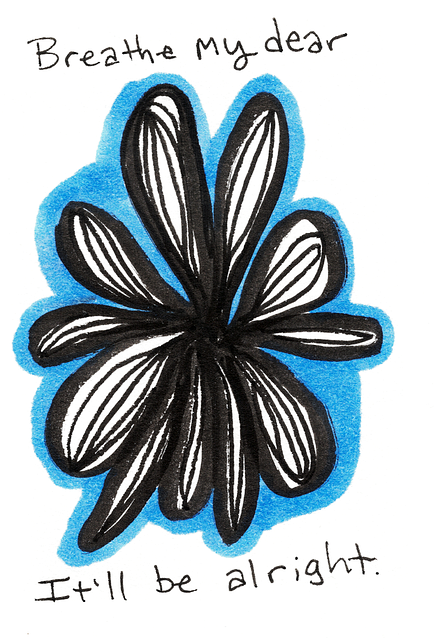Louisville Abuse Survivors Therapy (LAST), a non-profit offering specialized mental health services, aims to expand its reach through an app marketing strategy targeting individuals beyond Louisville seeking burnout prevention, emotional healing, and resilience building. This involves social media campaigns, recovery story content, partnerships with mental health organizations, and SEO keyword integration for visibility. The thriving mental health app market in Kentucky, especially among diverse urban centers like Louisville, presents a unique opportunity to cater to the growing demand for digital therapy and trauma-informed care. By focusing on evidence-based practices, personalized support, and anytime, anywhere access, LAST apps can stand out and empower survivors to take control of their mental wellness. Content marketing, community engagement through peer-to-peer connections, and strategic SEO keywords are key to connecting with a broader audience and establishing LAST as a trusted trauma support resource.
Louisville Abuse Survivors Therapy (LAST) offers a specialized mental wellness service catering to survivors of abuse. To thrive in the competitive app market, this article explores a comprehensive marketing strategy for LAST. We begin by dissecting its target audience and analyzing Kentucky’s mental health app landscape. By highlighting unique selling points and crafting compelling content, LAST can establish itself as a trusted resource. Engagement strategies focusing on community building are crucial for long-term success, ensuring the app remains a vital support system for its users.
- Understanding Louisville Abuse Survivors Therapy (LAST) and its Target Audience
- Market Research: Analyzing the Mental Health App Landscape in Kentucky
- Positioning LAST: Unique Selling Points and Value Proposition
- Content Marketing Strategies for Mental Wellness Apps
- Engagement and Retention: Building a Community Around LAST
Understanding Louisville Abuse Survivors Therapy (LAST) and its Target Audience

Louisville Abuse Survivors Therapy (LAST) is a non-profit organization dedicated to providing specialized mental health services for individuals who have experienced abuse and trauma. Their mission is to empower survivors through therapy, education, and support, helping them heal and rebuild their lives. LAST offers a range of programs tailored to address the unique needs of its target audience—survivors of abuse, including domestic violence, sexual assault, and other forms of trauma.
The app marketing strategy for LAST should focus on reaching individuals who are not only in Louisville but also those seeking services related to burnout prevention, emotional healing processes, and resilience building. By utilizing targeted digital marketing techniques, LAST can increase its visibility and attract users who may benefit from their specialized therapy services. An effective strategy could include social media campaigns, content creation that shares recovery stories, and partnerships with other mental health organizations to expand their reach and build trust within the community.
Market Research: Analyzing the Mental Health App Landscape in Kentucky

The mental health app market in Kentucky, particularly within urban centers like Louisville, presents a unique opportunity for innovative solutions addressing widespread concerns. Market research reveals a growing demand for digital therapy and support services, especially among populations such as abuse survivors seeking trauma-informed care. Apps focused on self-esteem improvement and mental wellness are gaining traction, catering to individuals looking for accessible and discreet ways to manage their mental health.
Louisville’s diverse community includes a mix of young professionals, students, and individuals facing various challenges, many of whom may benefit from digital tools tailored to their specific needs. By understanding the local landscape, app developers can identify gaps in current offerings, whether it’s providing specialized trauma support services or focusing on niche aspects of mental wellness. This strategic approach ensures that apps cater to the unique requirements of Louisville’s residents, fostering a more inclusive and accessible environment for those seeking emotional well-being.
Positioning LAST: Unique Selling Points and Value Proposition

In the competitive landscape of mental wellness apps, positioning yourself last can be a powerful strategy if executed right. For apps targeting Louisville Abuse Survivors Therapy (LAST), this means carving out a unique niche and communicating it effectively to attract a specific audience. Highlighting untapped features or addressing gaps in current solutions can set your app apart. For instance, focusing on evidence-based practices, integrating therapeutic techniques like conflict resolution techniques, or offering personalized support tailored to survivors’ needs can be compelling selling points.
The value proposition should directly address the unique challenges and aspirations of LAST participants. Emphasize how your app provides accessible, anytime, anywhere support; facilitates connections with peers and professionals; offers mental health education programs design tailored for their journey; and aids in building resilience and self-esteem. By communicating these distinct advantages, your app can position itself as a vital tool in the recovery process, ensuring survivors feel empowered to take control of their mental wellness.
Content Marketing Strategies for Mental Wellness Apps

In the digital age, content marketing is a powerful tool for Louisville Abuse Survivors Therapy apps to connect with their target audience and promote mental wellness. By creating valuable and engaging content, these apps can establish themselves as trusted resources for individuals seeking trauma support services and resilience building. Strategies such as blog posts, articles, or even video series can educate users on various aspects of coping skills development, offering practical insights and tips tailored to different situations.
Focusing on storytelling, personal experiences, and expert opinions can humanize the app and foster a sense of community. Incorporating keywords like “Resilience Building” and “Coping Skills Development” naturally within this content ensures better search engine visibility while addressing the unique needs of survivors. This approach not only helps in reaching a broader audience but also positions the app as an authoritative source for trauma-related support, fostering user loyalty and engagement.
Engagement and Retention: Building a Community Around LAST

Mental wellness apps that foster engagement and retention create a sense of community among users. This is particularly impactful in the context of Louisville Abuse Survivors Therapy (LAST), where support networks are vital for long-term healing. By integrating features that encourage peer-to-peer connections, users can share experiences, offer encouragement, and learn from one another—a powerful tool in trauma support services.
Building a community around emotional regulation and risk management planning for mental health professionals not only enhances the app’s user experience but also increases its value as a resource. Regular interactions and collaborative problem-solving help users develop coping strategies and strengthen their resilience, ultimately improving their overall mental wellness. This sense of belonging can be transformative, especially for individuals navigating complex emotional landscapes following traumatic experiences.
Louisville Abuse Survivors Therapy (LAST) has carved out a niche in the mental wellness app market by focusing on a specific yet critical demographic. Through thorough market research, LAST identified a unique value proposition centered around trauma recovery for survivors of abuse. By employing strategic content marketing and fostering a supportive community, the app can ensure long-term engagement and become a go-to resource for those seeking healing in Kentucky and beyond. This targeted approach is key to standing out in a competitive mental health app landscape while effectively supporting users on their journey to mental wellness.














